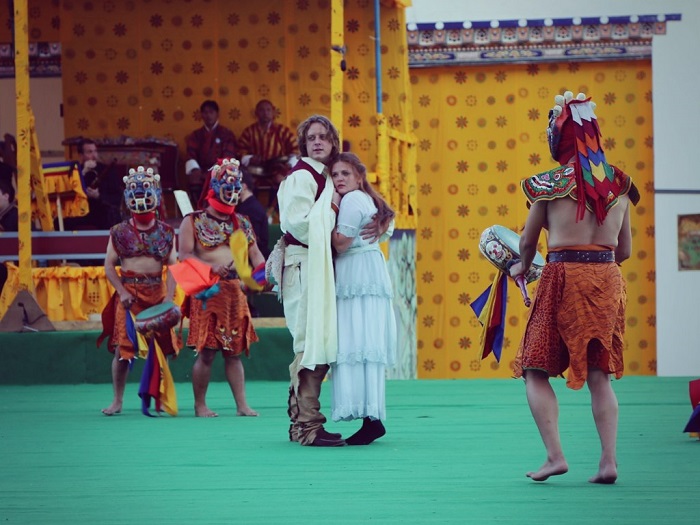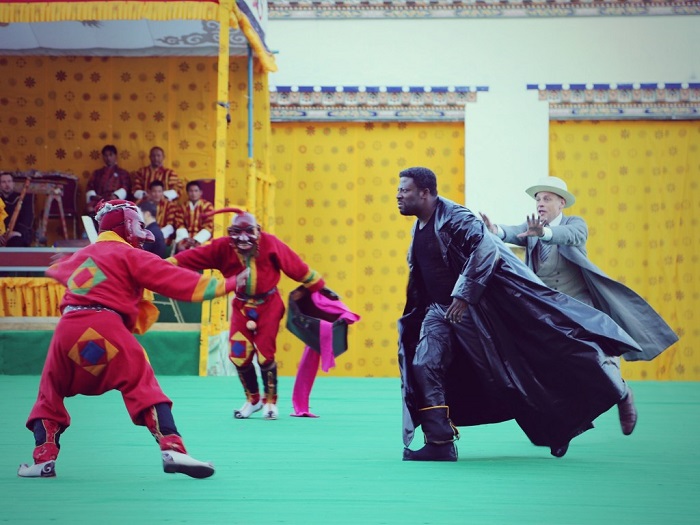Staging Bhutan's First Opera

The Folklife Festival hosted a program on Bhutan in 2008 that was the largest and most comprehensive celebration of Bhutanese life and culture ever hosted outside the remote Himalayan Kingdom. As with many Festival programs, Bhutan: Land of the Thunder Dragon resulted in new and expanding relationships, leading to some surprising events.
Most recently, it provided the opportunity for a classical musician from Rome to stage the first ever opera in Bhutan—one that was true to its Western musical and dramatic cultural roots but also incorporated authentic Bhutanese artistic and cultural expressions. Accomplished performer and conductor Aaron Carpene first presented the idea of producing an opera in cooperation with the Bhutanese in 2004. It took nine years to realize, with a stop at the Folklife Festival along the way.
Of all musical genres, opera—by combining music, voice, movement, and symbolism to convey deeply felt human experience—may share the most with Bhutanese musical expression. We selected Handel’s Acis and Galatea because its universal theme of the redemptive power of love speaks poignantly to audiences everywhere. The opera is also sung in English, which is widely spoken in Bhutan. Ultimately, the idea was to stage the world premiere of a new production in Bhutan—nestled within the mystical and dramatic landscape of the Eastern Himalayas—which would reinforce the project’s cross-cultural creative roots.
Such a complex project requires the support and participation of a big team. In part because of the goodwill resulting from Bhutan’s participation at the 2008 Folklife Festival, the Royal Government of Bhutan endorsed the project. The University of Texas at El Paso (UTEP), which has long-standing ties with Bhutan, was also eager to be a major sponsor for the important educational opportunities offered, a historic musical first.

The new production was created by Stefano Vizioli, an internationally recognized opera director from Rome whose work has been staged in leading opera houses throughout Europe, Asia, and the Americas, and performed under the musical direction of Mr. Carpene. Artists from approximately ten countries participated, including performers from Bhutan’s Royal Academy of Performing Arts, some of whom participated at the Bhutan program at the 2008 Smithsonian Folklife Festival.
The orchestra was mix of UTEP students, professional baroque musicians from Europe, and Bhutanese traditional musicians. Singers came from Africa, Europe, and North America. We flew in the first harpsichord ever seen or played in Bhutan. A Roman designer created the Western costumes that complemented Bhutanese masked-dance costumes, with special Bhutan-inspired clothing for Galatea and Acis created in partnership with the Royal Textile Academy. For the weeks preceding the premiere, singers rehearsed with Bhutanese dancers and musicians at the performing arts academy while the orchestra practiced separately at the Royal Textile Academy. The all-day rehearsals were open and free to the public, luring many locals with the strange sights and sounds. Singing is a popular pastime in Bhutan, and shortly into rehearsals, Bhutanese children were singing Handel’s “Happy We!” together with Acis, Galatea, and the chorus.
With such remarkable cultural interaction, a new original production of Acis and Galatea premiered in Bhutan’s capital city, Thimphu, on October 12, 2013. Special guests included Her Majesty Queen Mother Sangay Choden Wangchuck, Prime Minister Tshering Tobgay, and other officials of the Royal Government of Bhutan. The performance also attracted many curious Bhutanese and several groups of foreign visitors from Italy, Australia, Thailand, and the United States who traveled to Bhutan specifically to experience the country’s first opera.
In the same way the production introduced the Bhutanese to the sights and sounds of Handel’s music and instruments like the harpsichord, bassoon, violin, cello, and oboe, many visitors from abroad experienced the mysticism of Bhutanese masked-dance and the haunting sounds of traditional instruments scarcely heard outside the Eastern Himalayas. In all cases, the production incorporated the artistic expressions from each culture in ways that genuinely reflected the meaning of the art—thereby avoiding the blender-results of shared cultural events sometimes described as “fusion” that confuse or lose all meaning.
The opera is scheduled to be restaged with the original cast at UTEP on August 30, 2014, as part of the university’s centennial celebrations. The public is welcome!
Artist and filmmaker Tao Ruspoli, whose family hosted Handel in Italy in the early eighteenth century, created this video about the opera project.
Preston Scott, a guest curator at the Smithsonian Center for Folklife and Cultural Heritage, coordinated development and curated the Bhutan: Land of the Thunder Dragon program at the 2008 Smithsonian Folklife Festival. He has served as an advisor to the Royal Government of Bhutan on a range of environmental and cultural projects for more than a decade and was executive producer of the original new production of G.F. Handel’s Acis and Galatea in Bhutan.

